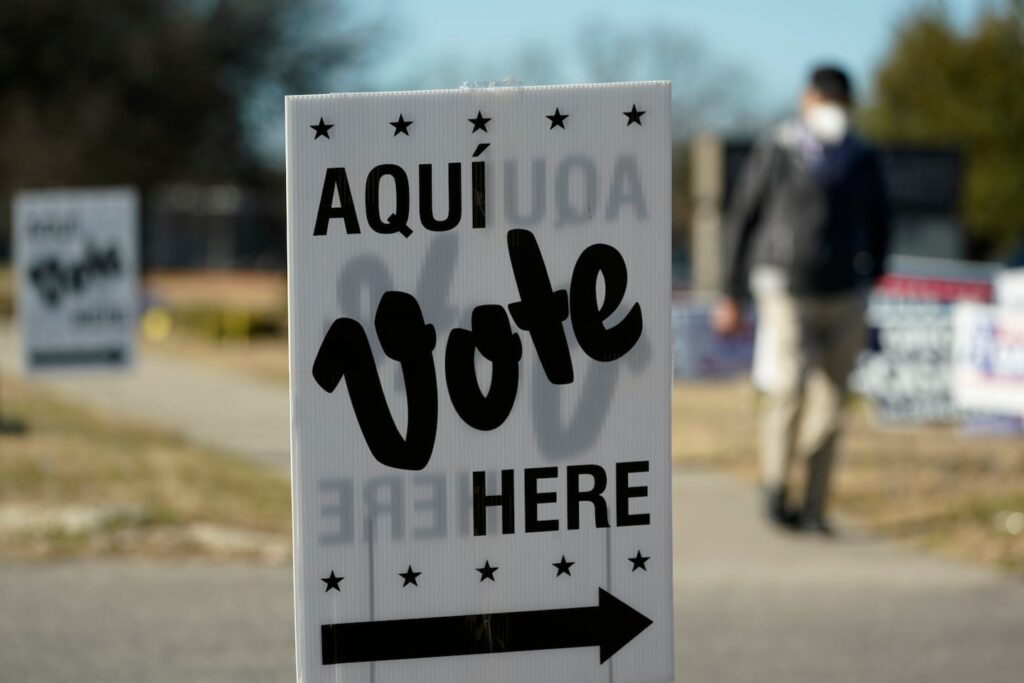Luis A. Miranda Jr. is president of the Latino Victory Fund and author of Relentless: My Story of the Latino Spirit That Is Transforming America.
Having worked in Latino politics a lifetime, we've recently been faced with a question: Why would Latinos expect to vote for a candidate who claims that immigrants are “tainting the blood of our nation?”
Answering that question requires examining conventional wisdom about Latino voters: Many Democrats believe that Latino voters, like other elements of the party's base, act as a kind of bloc that broadly shares experiences of oppression in this country.
Racial politics are an unhealed wound in the United States, and racism clearly feeds into the anti-immigrant bigotry of Donald Trump and his MAGA supporters.
But Latino politics is far more complicated than that. Yes, Latino voters support Democrats. But they don't automatically support Democrats. They are persuadable swing votes, and this single misconception is hurting President Biden and his party.
Let's start with the numbers. Most analysis of Latino voters is based on national polls that target a small minority of Latino voters. Most of these polls are conducted in English, ignoring the roughly one-quarter or more of Latino voters whose first language is Spanish. These polls spit out unreliable headlines.
Latino support for Biden and Trump should be measured against a detailed analysis of both actual 2020 ballots and exit polls. And the data is mixed: A survey by the Latino Policy and Politics Institute at the University of California, Los Angeles (UCLA) found that Latino voters supported Biden over Trump by nearly three-to-one in some states, such as California and Arizona, and two-to-one in others, such as Texas and Florida.
In battleground states like Georgia and Wisconsin, the margin of Latino support for Biden was larger than the margin of Biden's victory over Trump.
But there is also evidence that the Latino vote has shifted in recent years. In 2020, Biden won 59% of the Latino vote, including 61% of women and 57% of men. In a March 2024 Ipsos poll of about 1,000 people in English and Spanish, targeting only Latino voters, Biden's favorability rating was 41%, while Trump's was 32%. Biden appears to have regressed considerably from four years ago, while Trump has remained largely unchanged.
So the story of this election, at least for now, is not so much about Trump gaining support as it is about Biden losing it, a softening support that reflects in part Biden's age and widespread anxiety over inflation and immigration.
And part of it reflects the Democratic Party's taking Latinos for granted, especially because of the party's long-held assumption that Latinos would vote the same way as their African-American neighbors. Persuadable voters need to be persuaded. They need constant contact in their own space and their own language. They need to be understood.
For the country's diverse Latino community, that starts with understanding where their families came from and when they arrived. Democrats should expect newcomers from Venezuela to share the distrust of socialism that has long characterized Cuban Americans.
For example, they are better prepared for the misinformation that leaks out through social media linking Biden to Sen. Bernie Sanders (I-Vt.) simply because they respect each other. Combating the lies that Latino voters have bought into should be a daily battle for Democrats.
Republicans don't need to win over Latino voters to beat Biden, they just need to alienate enough of them to weaken Biden's coalition.
Instead of just playing defensively, Democrats should speak directly to Latinos who see Trump as someone they know well back home: a strongman who pretends to look out for the vulnerable.
So far, the biggest issues for Latinos have been economic concerns: jobs, wages and prices. With unemployment low and wages rising, Democrats should be speaking directly to Latinos about the disaster of President Trump's pandemic economy.
Democrats often assume that immigration reform is their only hope of winning over Latino voters. Republicans often assume that treating new immigrants like political balls won't erode their support with Latino voters. Both positions are wrong.
Latinos are not unaware of the burden that comes with increased migration — the communities facing the greatest burden at the border are often majority Latino. What unites us is our desire for a humane and orderly approach to migration — an approach that is transparent, safe and respectful.
We are proud of our diversity, but we share an important attitude that both parties need to understand: We are here to work hard and build a better life for our children, and when we need it, we expect our government to help us along the way, whether that's a quality education for our children or social security for our seniors.
Above all, we want to be respected, not ignored, denigrated or taken for granted.



